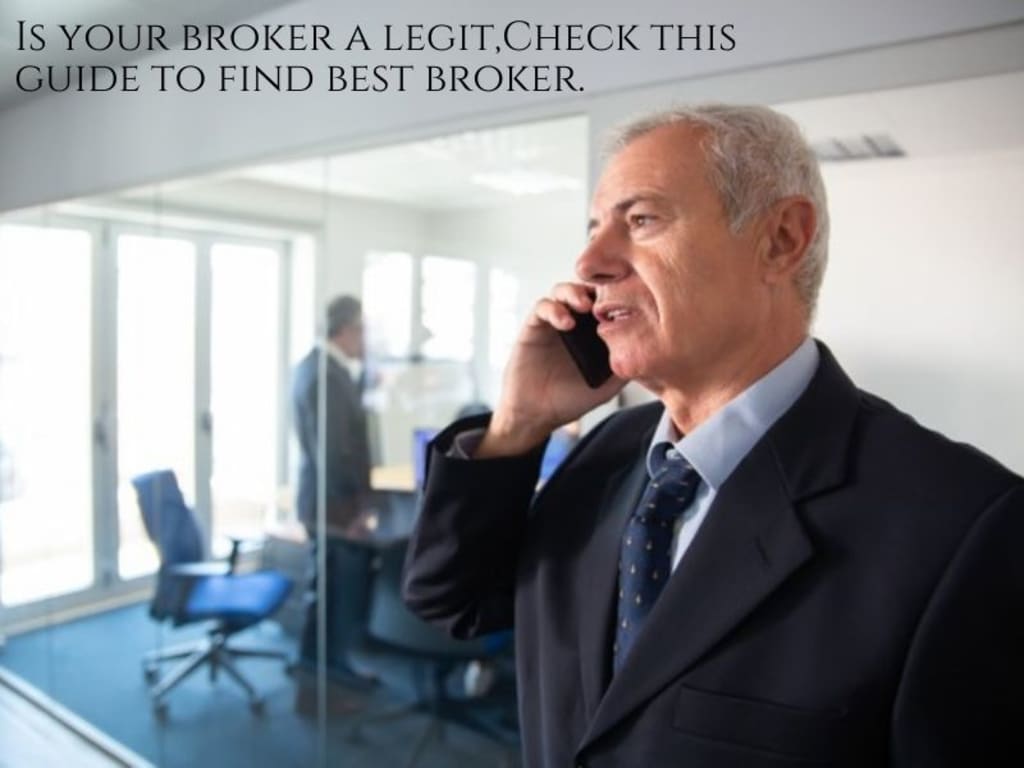
With so many forex brokers on the market, finding a trustworthy broker can be difficult. Check here for reliable broker reviews to help you with your decision. It will assist you in making an educated selection.
It may appear difficult to choose a forex broker for the first time, but it is actually rather straightforward. Your primary concern should remain the security of your funds. As a result, the forex broker must be legitimate and trustworthy, and unable to defraud you of your hard-earned funds.
Before doing business with a broker or financial advisor, make sure to research them and their companies. You should also be aware of specific signals that a financial professional is attempting to defraud you.
Following are the steps to find out if the broker is legit or not
1. Cold Contacts Should Be Avoided
Any broker or investment advisor who calls you without your permission from a company with whom you've never done business should be avoided. A phone call, email, or letter could be used to make contact. Don't be fooled by invites to investment seminars that offer free lunches or other incentives in exchange for lowering your guard and investing recklessly.
In a 2013 study by the FINRA Investor Education Foundation, 64% of individuals aged 40 and over stated they had been asked to a "free-lunch" lecture.
Callers that use high-pressure sales tactics, advertise once-in-a-lifetime chances, or refuse to deliver written information regarding an investment should be avoided, according to the SEC.
2. Have a Discussion
You need to feel at ease with the people who will be giving you with advise, goods, and services, whether you're looking for a broker or a financial advisor. Ask a lot of questions about the services provided by the organisation and its experience working with clients that have comparable demands to yours.
Also, learn about the professional's interaction with you. When advising investments, for example, financial professionals must put their clients' interests ahead of their own under the so-called fiduciary standard.
This is a higher threshold than the so-called appropriateness criterion, which just requires the professional to make suggestions that are in the client's best interests. While investment advisors must always follow the fiduciary standard, broker-dealers are not required to do so. However, you may be able to identify a broker-dealer who is willing to follow the fiduciary standard.
Go somewhere else if you can't receive straight answers or if the person seems rushed or otherwise unwilling to supply you with complete and accurate information. Remember to inquire about prices, fees, and charges.
3. Conduct some preliminary research
When looking for a financial professional, the first thing to try is a basic web search using the broker's and firm's names. This could bring up recent press releases or media accounts of alleged misbehaviour or disciplinary actions, as well as client conversations on internet forums, background information, and other information.
Then go straight to the regulatory agencies and conduct a search. Financial professionals and their firms must register with federal and state securities regulators under federal and state law. And the public has access to this information, as well as the facts of any disciplinary measures taken against persons or businesses.
Keep in mind that the agencies' enforcement jurisdictions may overlap at times, and they may give comparable information. Even so, it's worth double-checking them all because they may have varying regulations about the information they provide and how long the data is accessible.
4. Make sure you're a member of the SIPC.
You should also check whether a brokerage firm is a member of the Securities Investor Protection Corporation (SIPC), a non-profit organisation that protects investors for up to $500,000 (including $250,000 for cash) if the company goes out of business, similar to how the Federal Deposit Insurance Corporation (FIDC) protects bank customers.
Always make cheques payable to the SIPC member firm rather than an individual broker when investing.
5. Review your statements at a regular basis.
Putting your money on autopilot is the worst thing you can do. Checking your statements thoroughly, whether you get them online or in the mail, might help you catch malfeasance or even mistakes early on. If your investment results aren't what you expected or if your portfolio has undergone unexpected adjustments, ask questions.
Accepting convoluted assurances that you don't understand is a bad idea. If you're having trouble getting accurate answers, ask to talk with someone in charge. Never fear that you’ll look ignorant or be viewed as a nuisance.
6. Withdraw funds and complain if you're unsure.
Remove your funds from the financial advisor if you suspect impropriety. After that, file complaints with the same state, federal, and private regulators whose websites you visited when you first investigated the financial professional.
There are a few actions that you might take if you believe you have a real disagreement with your broker or advisor. If you have a complaint about a stockbroker, you must register a dispute with the Securities and Exchange Commission (SEC) or the Financial Industry Regulatory Authority (FINRA).
Another option is to contact state or provincial securities commission. Complaints against brokers, advisors, and financial planners are handled by a division in each state or province. If none of the mentioned options work, you will have no choice except to employ an attorney.
Conclusion
Although the Great Recession is past, broker and investment advisor misconduct continues. So, before you hand over money to a financial professional, do your homework and keep a tight eye on your accounts. For valid reasons, investments may not perform as well as predicted.
But don't be afraid to take your money out if you're unhappy with your returns or have other problems that the advisor doesn't address fast and effectively.





Comments
There are no comments for this story
Be the first to respond and start the conversation.